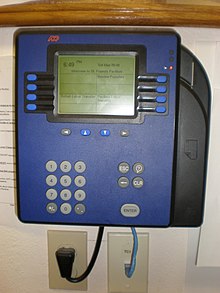Timesheet
A time sheet is a method for recording the amount of a worker's time spent on each job.
Use
Originally developed for an employer to determine payroll, timesheets are not just for payroll anymore. Time sheets may record the start and end time of tasks, or just the duration. It may contain a detailed breakdown of tasks accomplished throughout the project or program. This information may be used for payroll, client billing, and increasingly for project costing, estimation, tracking and management.
Some companies provide web-based timesheet software or services that provide a means to track time for payroll, billing and project management. This project management data can make complex cost relationships visible, thereby allowing lower costs. This knowledge can drive corporate strategy as users let their competitors perform the unprofitable work.
Time cards

Factory workers often have a "time card" and "punched in" by inserting their card into an automatic timestamp machine (sometimes known as a bundy clock) when starting and ending their work shift.
Advantages
Time tracking can lower costs in 3 ways: by making payroll processing more efficient, by making costs visible so you can lower them, and by automating billing & invoicing.
Time tracking can increase revenue through automating billing, which tends to make it easier for a company to get correct invoices out for all hours worked by consulting staff. This speeds up payment and eliminates the hassles of 'dropping' bills.
By lowering costs in 3 ways, and increasing revenue in one way, timesheet management technologies that are web-based can improve the health of companies.
In the project management world, timesheets can also be used to build a body of knowledge about how much effort tasks take to develop. For example if developing a training plan has historically taken a month, then it can be assumed that creating a new one will take a month. Also most timesheet software has the ability to track resource costs and project expenses to allow for better future budgeting.
For the HR function, the time spent on activities by individuals can be analyzed over a period of time and categorized into broad types. Based on the outcome roles could be realigned.
Disadvantages
This article's tone or style may not reflect the encyclopedic tone used on Wikipedia. (December 2007) |
- Prone to human error.
- Repetitive.
- Rounding errors (12:27:34 is not the same as 12:30)
